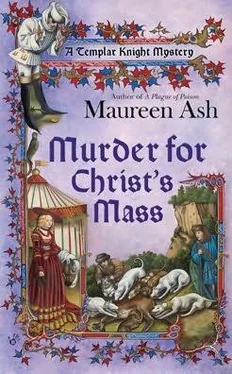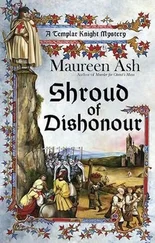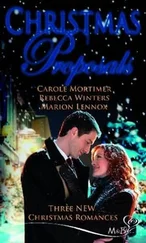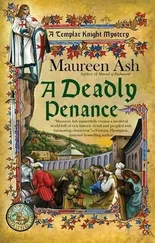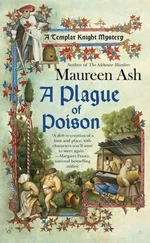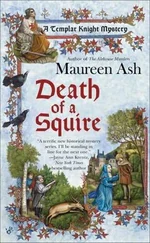Maureen Ash - Murder for Christ's Mass
Здесь есть возможность читать онлайн «Maureen Ash - Murder for Christ's Mass» весь текст электронной книги совершенно бесплатно (целиком полную версию без сокращений). В некоторых случаях можно слушать аудио, скачать через торрент в формате fb2 и присутствует краткое содержание. Жанр: Исторический детектив, на английском языке. Описание произведения, (предисловие) а так же отзывы посетителей доступны на портале библиотеки ЛибКат.
- Название:Murder for Christ's Mass
- Автор:
- Жанр:
- Год:неизвестен
- ISBN:нет данных
- Рейтинг книги:5 / 5. Голосов: 1
-
Избранное:Добавить в избранное
- Отзывы:
-
Ваша оценка:
- 100
- 1
- 2
- 3
- 4
- 5
Murder for Christ's Mass: краткое содержание, описание и аннотация
Предлагаем к чтению аннотацию, описание, краткое содержание или предисловие (зависит от того, что написал сам автор книги «Murder for Christ's Mass»). Если вы не нашли необходимую информацию о книге — напишите в комментариях, мы постараемся отыскать её.
Murder for Christ's Mass — читать онлайн бесплатно полную книгу (весь текст) целиком
Ниже представлен текст книги, разбитый по страницам. Система сохранения места последней прочитанной страницы, позволяет с удобством читать онлайн бесплатно книгу «Murder for Christ's Mass», без необходимости каждый раз заново искать на чём Вы остановились. Поставьте закладку, и сможете в любой момент перейти на страницу, на которой закончили чтение.
Интервал:
Закладка:
“Apparently Partager came into the chamber where Cerlo was working just as the mason had removed the tiles that covered the floor. The sacks lay just below. When the pair saw the size of the cache, it did not take long for them to come to an agreement to keep the contents. Cerlo was desperate for money to sustain himself and his wife, and Partager wanted funds to get his wife away from Lincoln and Legerton’s bed. The trove seemed like a heaven-sent answer to both men’s problems. They acted quickly, using the bag that contained Cerlo’s work tools to carry the sacks to the assayer’s room and hide them underneath some garments in his clothes chest. They had to make two or three trips over the course of the day to get it all safely stowed and be sure none of the servants noticed their comings and goings. Fortunately for them, Legerton’s sister, Silvana, was keeping all the staff busy giving the house a thorough cleansing while her brother was away and Partager’s wife, Iseult, had gone to Lincoln to visit her sister.
“After they had hidden the contents of the trove, Cerlo and Partager discussed how they could dispose of it. They knew the age of the coins would prevent them from being exchanged, so they decided to leave the silver, and the jewellery, in the chest while the assayer applied for a vacancy at a mine in Tynedale. Once there, under the guise of carrying out his duties, Partager had enough skill to use the mine’s forge to melt the coins down slowly, just a few at a time, and fashion them into ingots. His actions would not be questioned-it is common for assayers to use a crucible for testing the purity of silver ore. Partager could then sell the ingots and the rest of the jewellery slowly, one piece at a time, to different gold- and silversmiths in one or more of the larger northern towns.
“Although it would have taken a long time to realise the full value of the trove, neither Partager nor Cerlo were in a hurry for their profit. Cerlo was content to receive a steady supply of small sums of money that Partager would bring to Lincoln once or twice a year, and the assayer simply wanted the wherewithal to keep his errant wife from straying. It might have taken them years to dispose of it all, but it would most certainly have provided an ample extra income for both men.”
“Why did they decide to divulge the secret to the clerk, Peter Brand?” Bassett asked. “Surely they were taking a grave risk by doing so.”
“To secure the post at Tynedale Partager had to pay a fee of five pounds to the overseer of the mine; he would also need some silver to finance his and Iseult’s journey north. He and Cerlo decided to sell a few of the smaller pieces of jewellery to cover the cost of the venture. They chose to approach Tasser because of his unsavoury reputation; even if he suspected the provenance of the items, they reckoned his greed would overcome any scruples he might have. But they were still wary-it would be best if neither of them was involved in the sale. Tasser knew Partager worked at the exchange, he would immediately wonder how the assayer had come by such sudden wealth and the same could be said of Cerlo, a lowly mason at the cathedral. If either of them attempted to carry out the transaction, they would be risking extortion by the silversmith. So they decided to use someone who was unknown to Tasser; a person who could spin the silversmith a tale about the origin of the jewellery and not be suspected of lying. Brand seemed the perfect choice-he had only lived in Lincoln for just over a year and was relatively unknown about the town. Partager had heard from other employees at the mint about the clerk’s impatience to save enough money to wed a girl in Grantham and approached him. When he asked if Brand was willing to help them for a small consideration, the clerk readily agreed.
“Partager never told Brand the extent of the horde he and Cerlo had found or where they discovered it. The assayer merely said the mason had found a few bits of jewellery and one small bag of coins in the foundations of an old house near the quarry and had come to the assayer for advice on how to dispose of it. It was Partager who fabricated the tale Brand told Tasser about inheriting the jewellery and, if Fardein had not been present when the clerk related the story, it might have worked. Tasser was suspicious, but not unduly so.”
“And the coins that Brand had in his purse on the night he was murdered?” Camville asked. “Why was he taking them to the quarry?”
“Partager told Cerlo that as soon as he heard whether or not he had been awarded the position at the mine he would come to the cathedral for early-morning Mass-a service the mason always attended-and let his accomplice know the outcome. And, on the twentieth day of December, that is what the assayer did; he went to the cathedral, found Cerlo and told him the position was secured and he was expected to commence his new employment by the middle of January. He had formerly promised Cerlo, as evidence of good faith, that he would give the mason a bag of the old coins, but because he didn’t want to give them to Cerlo in full view of the parishioners attending Mass in the cathedral, he said he would send Brand to the quarry with them the next day. They agreed that dusk would be the best time for the clerk to arrive; even though the quarry was shut down due to the winch being inoperative, there might be some of the quarrymen about the pit during the daylight hours. And that is why the clerk was there on the twenty-first day of December, and at that time.”
“And because his wife’s accident made the mason late for the appointment, Brand was killed by Fardein, who saw his chance to rob the clerk and took it,” Bassett said.
“Which led the apprentice into demanding a share in the trove from Cerlo,” Bascot confirmed, “and to Fardein’s death when the mason lured him outside the walls of Lincoln and killed him.”
They looked at the riches contained in the sacks piled on the table. “It may be a valuable find,” the Templar said, “but it has caused untold misery to many people.”
“Whether it has or not, it can now be turned over to the Exchequer,” Camville said with satisfaction. “I will leave it to one of their officials to try and discover if there is an heir that may have a legitimate claim to the trove, or whether they are all dead.”
“I think we may have found the answer to that, Gerard,” Nicolaa said from the doorway. She and Richard entered the room, the castellan holding a piece of parchment in her hand.
When both Nicolaa and her son were seated and had full cups of wine in their hands, Bascot repeated, at the castellan’s request, the circumstances of how it had been discovered that it had not been Walter Legerton who had conspired with Cerlo but his assayer, Simon Partager. When he finished, the sheriff asked his wife what she had meant by her earlier statement that she knew who had secreted the cache.
“After de Marins and de Laxton left to arrest Legerton, Richard and I searched the castle archives-with John Blund’s help-for records of who had owned the property at Canwick in the days of King Stephen. I remembered my father saying that my grandsire had granted the fee of a Haye property there in perpetuity to the church of St. Clement as a gesture of thanks-giving for the birth of his son. I thought that if I consulted the record of his gift, it might also give the name of the people who held other properties in the area.”
This was a distinct possibility. Land was often delineated by naming those adjoining it and usually included the information of whether it was held in fee from a lord or the crown, and by whom.
Nicolaa took up the piece of parchment she had been holding. “John Blund found this. It is the record of my grandsire’s donation to the abbey and mentions a property-one arpent in size-on the northern border of the Haye land. It was a small property and is recorded to have been held in fee from the see of Lincoln by one Otto, minter to the crown.”
Читать дальшеИнтервал:
Закладка:
Похожие книги на «Murder for Christ's Mass»
Представляем Вашему вниманию похожие книги на «Murder for Christ's Mass» списком для выбора. Мы отобрали схожую по названию и смыслу литературу в надежде предоставить читателям больше вариантов отыскать новые, интересные, ещё непрочитанные произведения.
Обсуждение, отзывы о книге «Murder for Christ's Mass» и просто собственные мнения читателей. Оставьте ваши комментарии, напишите, что Вы думаете о произведении, его смысле или главных героях. Укажите что конкретно понравилось, а что нет, и почему Вы так считаете.
